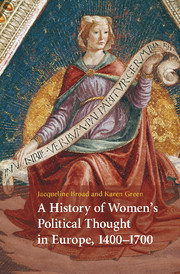Book contents
- Frontmatter
- Contents
- Preface
- Introduction
- 1 Christine de Pizan
- 2 Women of the Italian Renaissance
- 3 From Anne de Beaujeu to Marguerite de Navarre
- 4 Queen Elizabeth I of England
- 5 From the Reformation to Marie le Jars de Gournay
- 6 Women of the English civil war era
- 7 Quaker women
- 8 The Fronde and Madeleine de Scudéry
- 9 Margaret Cavendish, Duchess of Newcastle
- 10 Women of the Glorious Revolution
- 11 Women of late seventeenth-century France
- 12 Mary Astell
- Conclusion
- Bibliography
- Index
9 - Margaret Cavendish, Duchess of Newcastle
Published online by Cambridge University Press: 02 July 2009
- Frontmatter
- Contents
- Preface
- Introduction
- 1 Christine de Pizan
- 2 Women of the Italian Renaissance
- 3 From Anne de Beaujeu to Marguerite de Navarre
- 4 Queen Elizabeth I of England
- 5 From the Reformation to Marie le Jars de Gournay
- 6 Women of the English civil war era
- 7 Quaker women
- 8 The Fronde and Madeleine de Scudéry
- 9 Margaret Cavendish, Duchess of Newcastle
- 10 Women of the Glorious Revolution
- 11 Women of late seventeenth-century France
- 12 Mary Astell
- Conclusion
- Bibliography
- Index
Summary
During the civil war era in England, Leveller women were not the only female group to voice their political concerns: a few royalist women also addressed petitions to parliament. In 1642, on the eve of the first civil war, a group of ‘Gentle-women, Citizens Wives, [and] Tradesmens Wives’ published a petition addressed ‘To the Queens most Excellent Maiestie’. In this one-page text, the women do not assert their spiritual liberty or equality with men, they do not call for the right to separate from the national church, nor do they spell out their ‘equal interest’ in the commonwealth. Instead their humble petition is a call for Queen Henrietta Maria to show ‘tender Compassion’, and not to forsake her loyal subjects by moving abroad. A few years later, a woman named Mary Pope (d. 1653?) published three works in defence of the divine authority of kingship: A Treatise of Magistracy (1647), Behold, Here is a Word (1648), and Heare, heare, heare, heare, A Word or Message from Heaven (1648). In these works, Pope demonstrates a remarkable knowledge of biblical passages in support of ‘the absolute Impunity of Kings’ and of the absolutist claim that ‘they are not accountable to any on earth’. She argues in favour of both active and passive obedience to kings, because ‘God hath shewed unto you, that you are not to meddle with the King, no not although he hath acted and done contrary to the command of God and his own laws.’
- Type
- Chapter
- Information
- A History of Women's Political Thought in Europe, 1400–1700 , pp. 199 - 224Publisher: Cambridge University PressPrint publication year: 2009
- 1
- Cited by

